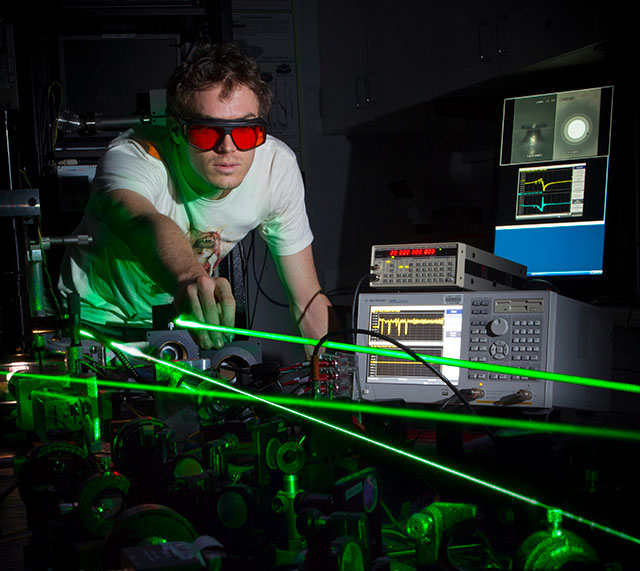ARC Centre of Excellence in Quantum Biotechnology
The ARC Centre of Excellence in Quantum Biotechnology aims to pioneer paradigm-shifting quantum technologies to observe biological processes and transform our understanding of life.
By partnering with industry and government, we seek to drive fundamental understanding and innovation across manufacturing, clean energy, agriculture, health and national security.
About
Our research program is developing quantum technologies that go far beyond what is possible today, from portable brain imagers to superfast single protein sensors.
We are using this technology to unravel complex, multiscale challenges in biotechnology, including how enzymes catalyse reactions and how higher brain function emerges from networks of neurons.
In close partnership with industry and government, we are working to build Australia’s quantum economy and train a future quantum workforce.
Our aims
We aim to:
- undertake groundbreaking, cross-disciplinary research, creating the first quantum technologies to solve key challenges in biotechnology
- define the new field of quantum biotechnology, nurturing the next generation in a new school of thought founded on multidisciplinary science and the transformational potential of quantum technologies
- drive quantum biotechnology innovation, partnering with national and global industries to grow Australia’s knowledge economy and generate socioeconomic impact
- back responsible quantum innovation, ensuring that rapidly evolving quantum technologies are applied in a sustainable and ethical manner
- champion an equitable, inclusive and diverse STEM culture, lowering barriers, engaging early and addressing all career stages.
For more information please visit the Quantum Biotechnology website.
Research
The ARC Centre of Excellence in Quantum Biotechnology bridges quantum science and biological science, creating a unique, vibrant, multidisciplinary environment for transformational research.
Our research program and methodology are designed to be deeply interdisciplinary, bringing our team together for major impact. Our investigators span quantum physics, biophysics, biology, chemistry and the humanities.
We are led by Professor Warwick Bowen.
UQ is ranked #9 in the world in biotechnology, according to the latest Shanghai Ranking's Global Ranking of Academic Subjects.
Research themes and projects
We collaborate across four research themes and invite you to collaborate with us.
We offer PhD projects within each theme.
Find out more about our research themes and projects.
People
Director
Chief Operating Officer
Chief investigators
UQ
- Dr Allison Fish
- Emeritus Professor Alan Mark
- Professor Alan Rowan
- Professor Halina Rubinsztein-Dunlop
- Professor Jennifer Stow
Flinders University
The University of Melbourne
- Dr Liam Hall
- Dr Elizabeth Hinde
- Professor Lloyd Hollenberg
- Associate Professor Kim-Anh Lê Cao
- Associate Professor David Simpson
University of Wollongong
University of Technology, Sydney
Partners
Administered by UQ, the ARC Centre of Excellence in Quantum Biotechnology has nodes at the University of Melbourne, the University of Technology, Sydney, the University of Wollongong and Flinders University.
We have 12 industry and governmental partners, including IBM, Olympus, Protein Evolution and the CSIRO.
We are partnered with 14 leading international universities, including MIT, Johns Hopkins University and the French National Centre for Scientific Research.
Nodes
- The University of Queensland
- Flinders University
- The University of Melbourne
- The University of Technology, Sydney
- The University of Wollongong
Industry partners
The future of quantum technologies
- Quantum technologies have revolutionary capabilities for applications in computing, communications and sensing.
- The Australian Government recognises quantum technologies as one of nine critical technologies fundamental to Australia’s economic prosperity, social cohesion and national security.
- The past few years have seen unprecedented growth in quantum start-ups, with investments tripling year on year since 2018.
- Biotechnology is the biggest projected market worldwide. Projections of the future scale of the market are approaching US$500 billion.

Contact us
Please visit the Quantum Biotechnology website or contact our director, Professor Warwick Bowen for more information.
